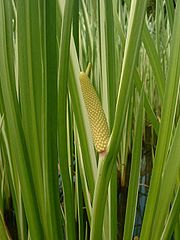Most experts will tell you that your food is only as good as the soil in which it is grown. Modern agricultural practices deplete the soil and then resort to chemicals to stimulate growth. One of the most intriguing observations in the Fukuoka Farming archives is that plants are actually 97.5% dependent upon sunlight and gases and only 2.5% of their nutrients come from the soil. Composting the parts of the plant that are not eaten restores much more to the soil than is removed by growing plants so year after year, the soil is enhanced instead of robbed. I have already proved this to myself by allowing everything to go more or less "wild" since last year.
Some of you will remember that as my commitment to composting strengthened, the main compost bin was moved -- to the dismay of the mice who used to live near it. The compost bin is in the back corner of the lot. The ground slopes a bit and that southeast corner is very wet. You first saw the compost bin in the background of the photo taken the day Savika moved in with me. She is standing behind the potato plants and in front of the compost bin.
The soil around the compost bin is moist so last week, I planted calamus there. It is used to detoxify the soil and it loves moisture.
It has been planted behind the pennyroyal and Corsican mint.
|
 |
  |
|
If anyone years ago had said that at age 66 I would be working this hard on something with a long-term future benefit and perhaps of little use to me personally, I probably would not have believed them, but the way I look at this now is that healing the land is no different really than healing a person. We are born with an innate right to health and opportunity but this is denied so many because the quality of our environment has been so degraded that most of us are not functioning optimally.
These little projects do not take much time. I doubt I am spending more than three hours a week on this transformation. Moreover, what appeals to me most about the Fukuoka methods are that they are essentially effortless. Moving with Nature rather than against Her, being in harmony and seeking that same harmony for others, including the plants and wildlife is natural. Everything else requires more exertion.
As for composting, there are countless ways to compost but ultimately one is taking biodegradable materials with the right mixture of green (nitrogen) and brown (carbon) and allowing these spent materials to return to dust. Denser material obviously takes longer to break down but leafy material can compost in two weeks if the bin is warm enough. I have four composting areas on my little piece of land. One is a simple "heap" of branches and leaves from fallen trees and what I have collected when raking. It will take a long time to compost. Another is a semi-open bin that basically prevents lighter materials from blowing around too much. Then, there is a one in the picture above and like its less sophisticated cousin, both of these have red wiggler worms to aid composting. They eat practically anything, including paper. Lastly, there is a tumbler, but it has yet to live up to the advertisements. Hopefully, it will redeem itself when the weather gets a bit warmer.
What I most like about composting is that I can create my own soil with cuttings and kitchen scraps and this means I am taking responsibility for the waste I generate and making sure that it is used constructively for the future. I believe that sustainable practices such as these are the best assurance we have that the Earth can be healed in a manner that will support life.
Next, I want to discuss my potato farming adventures.
Many blessings,
Ingrid
Mother's Day 2009
